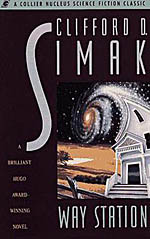
![]() couchtomoon
couchtomoon
8/1/2014
![]()
If pastoral SF is a legitimate subgenre, Clifford Simak's Hugo-winning Way Station (originally published as Here Gather the Stars) is at the top of its class, with its drowsy prose and idealistic plot. This is the science fiction book you read on your porch swing, sipping an ice cold lemonade in the dusk of a summer day, between periodic glances at Venus burning bright in the darkening sky.
When Enoch Wallace finds himself alone following his service in the American Civil War and the death of his parents, an alien approaches him to convert his Wisconsin country home into a way station for interplanetary travel. The arrangement brings the Civil War veteran into contact with unimaginable life forms, some of whom like to sit and chat over coffee, and share stories and souvenirs from their home planets, before catching their next stargate connection. Managing a galactic way station also comes with other perks, including impenetrable walls and decelerated aging, but those perks attract unwanted governmental attention to Enoch's home after 100 years. Enoch's way station isn't without controversy among the galaxy either, as other-world leaders threaten to shut it down due to Earth's childish aggression during the Cold War. After a century of peaceful hermitage, Enoch's life becomes enmeshed in impossible conflicts, protecting the station from suspicious government eyes, protecting the deaf, mute neighbor girl from her hillbilly father, and representing Earth as an interplanetary diplomat.
Simak's simple descriptions of daily living, gulping cold water freshly dipped from a pump, and sizzling eggs and bacon on an old gas stove, sets the pace for this unhurried galactic survey. Unlike most sci-fi tales, which carry the reader to distant worlds full of alien intrigue, Way Stationbrings the galaxy into our living rooms, to share coffee and conversation with strange old friends. Akin to people-watching at a metropolitan bus station, exoticism abounds at Enoch's station, while the comforts of home are within reach.
Much like his earlier Time is the Simplest Thing (1961), Simak likes to tackle many SF concepts at once, adding subplots about telepathy, ghosts, universal spiritualism, and virtual gaming, which makes the leisurely pace of this novel even more surprising. Wherein Time is the Simplest Thing, a classic escapee story, rushes frantically to each adventure, Way Station strolls, muses, and strolls some more. Simak meanders into some seemingly irrelevant subplots, yet they add significance to the overall theme of human violence, ignorance, and naiveté, as viewed through the lens of the Cold War. In one scene, Enoch practices shooting on an alien-designed virtual rifle range, only to later admit that his target practice is an unnecessary force of habit and, after killing an enemy alien (and apologizing for it), he tosses his gun into a ravine. This scene seems out of place, but it's Simak's analogy for humanity's violent logic, tempered with a hopeful end to a frightening time in history:
"He raised the rifle and held it for moment motionless and then he threw it out and watched it fall, spinning end for end, the moonlight glinting off the barrel, saw the tiny splash it made as it struck the water. And far below, he heard the smug, contented gurgling of the water as it flowed past this cliff and went on, to the further ends of Earth" (p. 228).
In Way Station, the ethical quandaries are many, but are all common staples of this decade's genre fiction. More interesting, the story is ultimately about a strange man's loneliness, as he explores his contradictory desire to both engage and avoid his fellow humans, as well as contradictory desires to uphold his rigid way station responsibilities and improve the destiny of humankind. Enoch's social isolation from both the Earth and galactic communities captures loneliness at its core. "The ache was there, the ache had been growing, the ache to tell all mankind those things that he had learned... that Man was not alone, that if he only found a way he need never be alone again" (p. 38). The reader wonders if Enoch's experience is real—his ghost friends cast doubt to his case—maybe the man just needs some real friends. Simak's winding style adds a warm ambiguity to poor Enoch's plight. Earth is alien unto him.
Some may take issue with Simak's simple optimism, his incongruent tie-ins, and his convenient outcomes, but it's all appropriate for the framework of this story. In some ways, it's too traditional. In other ways, it's too weird. The peculiar subplots match the strangeness of the universe; the rustic tone matches the author's persistent, albeit often disappointed, hopes for humanity.
I'm adding this to my reread list. This is a book I will return to again and again.
http://couchtomoon.wordpress.com